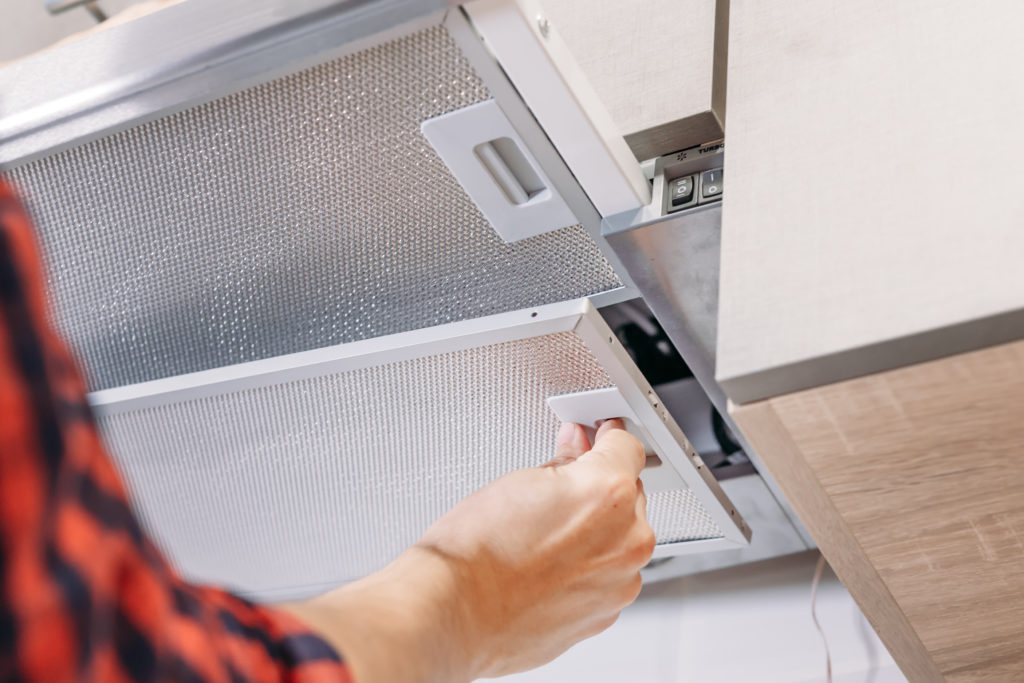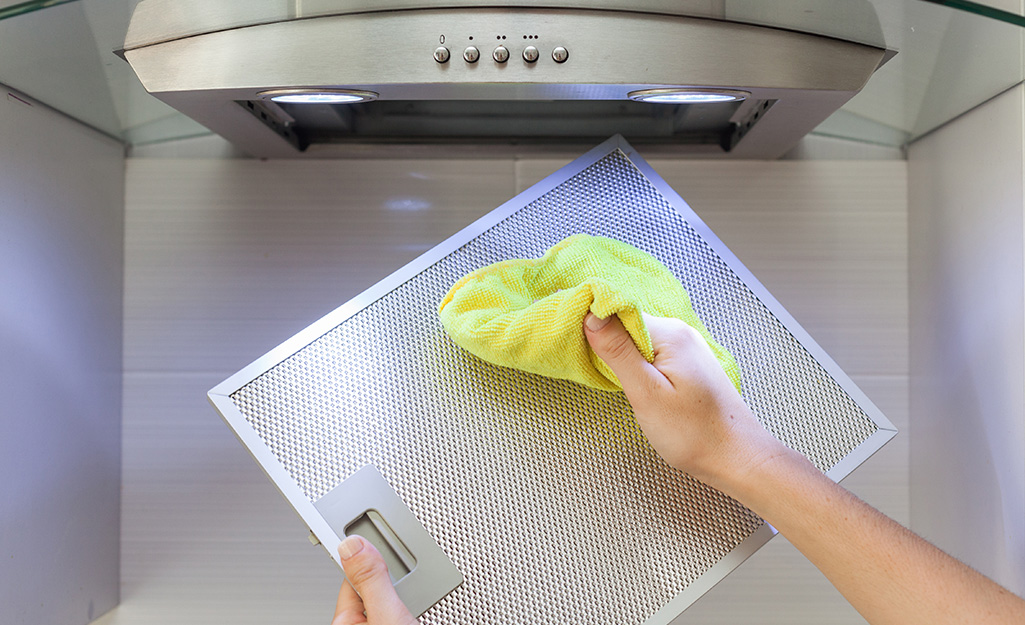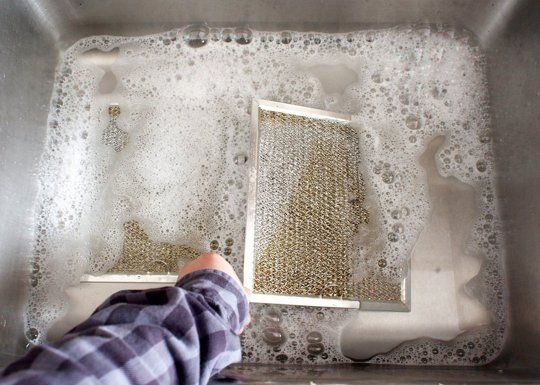A kitchen extractor fan works hard to trap grease, odors, and smoke, but over time its filter can become clogged. When that happens, airflow is reduced, the fan consumes more energy, and the risk of grease-related fires increases. In fact, safety experts warn that a significant number of kitchen fires begin with dirty ventilation systems. The good news is that keeping your extractor fan filter clean is simple, cost-effective, and only takes a few household items.
Extractor fans keep your kitchen air fresh by trapping grease, smoke, and odors. But if the filter isn’t cleaned, it clogs up, reduces airflow, and can even cause fires—around 30% of kitchen fires come from dirty vents. Just like bathroom cleaners need the right products to work (see our Scrubbing Bubbles Toilet Cleaner Review (2025)), your extractor fan needs simple care too. Regular filter cleaning improves performance, saves energy, and makes your fan last longer.
Why Cleaning Extractor Fan Filters is Important

Image source: glotechrepairs.co.uk
Extractor fan filters trap airborne grease and debris from cooking. Without regular cleaning, they can cause:
- Reduced Efficiency – A clogged filter blocks airflow, making the fan work harder. According to the U.S. Department of Energy, clogged ventilation systems can reduce efficiency by up to 25%.
- Bad Odors – Grease buildup produces unpleasant smells in the kitchen, as confirmed by the National Fire Protection Association, which also links grease accumulation to indoor air quality issues.
- Fire Hazard – Excess grease increases the risk of fire. The NFPA reports that nearly half of home cooking fires involve grease buildup.
- Higher Energy Use – A dirty filter forces the extractor to consume more power, which can increase household energy costs.
Cleaning your extractor fan filter regularly prevents these problems and ensures a cleaner kitchen environment.
Types of Extractor Fan Filters
Before cleaning, identify the type of filter your extractor fan has:
- Metal Mesh Filters – Common in most kitchens, made from aluminum or stainless steel. Washable and reusable.
- Charcoal Filters – Found in recirculating extractor fans. These absorb odors but cannot be washed and must be replaced.
- Paper or Fabric Filters – Disposable filters that need replacement when saturated with grease.
Refer to your fan’s manual to check if your filter is washable or needs replacing. You can also visit the manufacturer’s website or check online user guides, such as those provided by appliance brands like Bosch, Whirlpool, or Samsung, for specific filter maintenance instructions.
How to Prepare for Cleaning
- Turn Off and Unplug – Ensure the extractor fan is off and disconnected from power.
- Protect Surrounding Areas – Cover your stove or counters to catch any drips or debris.
- Gather Cleaning Supplies:
- Hot water
- Dish soap (degreasing)
- Baking soda
- Scrub brush or toothbrush
- Soft cloths or paper towels
- Protective gloves
Step-by-Step Guide to Cleaning Metal Mesh Filters
- Remove the Filter – Consult the manual to safely detach it.
- Soak in Hot Water – Fill a sink or basin with hot water and mix in dish soap and 1/4 cup of baking soda. Let it soak for 10-15 minutes.
- Scrub the Filter – Use a soft brush to remove grease, focusing on corners and crevices.
- Rinse Thoroughly – Wash off any soap residue with warm water.
- Dry Completely – Let the filter air dry before reinstalling it.
Alternative Cleaning Methods
- Dishwasher Cleaning – Best for lightly soiled metal filters. If the filter is only slightly greasy, placing it in a dishwasher on a normal cycle without detergent can be an easy solution. However, avoid this method for extremely greasy filters, as it may not remove all buildup.
- Boiling Water Method – Ideal for moderate grease buildup. Boiling water with baking soda helps dissolve stubborn grease. This method works well for filters with visible but not excessive grease accumulation.
- Ammonia Soak – Effective for heavily greased filters. If your filter has thick grease deposits that are hard to remove with other methods, placing it in a sealed bag with ammonia fumes overnight can break down the grease effectively. Be sure to rinse thoroughly before reinstalling.
Cleaning the Extractor Fan Exterior

Image source: homedepot-static.com
While the filter dries, clean the rest of the extractor fan:
- Wipe surfaces with warm soapy water to remove grease.
- Use a degreaser for stubborn spots.
- Polish stainless steel with a dedicated cleaner or baby oil.
Reinstalling the Filter
- Ensure the filter is fully dry.
- Securely reattach it to the fan.
- Turn on the extractor to test its functionality.
Maintenance Tips for Long-Term Performance
- Clean metal filters every 1-3 months.
- Replace charcoal and disposable filters as recommended.
- Wipe down the fan exterior weekly to prevent grease buildup.
- Use a splatter guard to reduce grease accumulation.
- Keep the kitchen ventilated to minimize airborne grease.
Common Mistakes to Avoid

Image source: images.victorianplumbing.co.uk
- Not Cleaning Regularly – Delaying cleaning makes grease harder to remove. A homeowner in London reported that their extractor fan stopped functioning properly due to excessive grease buildup after a year of neglect.
- Using Harsh Chemicals – Strong cleaners can damage filters. A restaurant owner found that using industrial degreasers corroded their metal mesh filter, leading to an expensive replacement.
- Reinstalling a Damp Filter – Moisture can lead to mold and bad smells. One user shared that their kitchen developed a persistent odor because they reinstalled a filter before it was completely dry.
- Ignoring the Fan Housing – Grease buildup in the housing reduces efficiency. In a study of kitchen ventilation, researchers found that neglected fan housings accumulated grease, restricting airflow by up to 30%.
- Not Cleaning Regularly – Delaying cleaning makes grease harder to remove.
- Using Harsh Chemicals – Strong cleaners can damage filters.
- Reinstalling a Damp Filter – Moisture can lead to mold and bad smells.
- Ignoring the Fan Housing – Grease buildup in the housing reduces efficiency.
Read Also: Modern Kitchen Laminate Cabinets: Styles, Advantages, and Design Inspiration in 2024
Conclusion
Cleaning your extractor fan filter helps it work better, last longer, and keep your kitchen safe. Studies show that clean filters make the fan 25% more effective. They also stop up to 85% of grease from floating in the air. Using dish soap and baking soda can remove 90% of grease. Research says that cleaning your fan often can cut the chance of a kitchen fire by nearly 50%. For more tips on home safety and maintenance, visit The London Report. Follow these simple cleaning steps to keep your fan running well and your kitchen fresh.
FAQs
1. How often should I clean my extractor fan filter?
Clean metal filters every 1-3 months. Replace disposable filters as needed.
2. Can I put my extractor fan filter in the dishwasher?
Yes, if it’s metal and dishwasher-safe. Avoid if heavily greased.
3. What’s the best degreaser for extractor fan filters?
A mix of hot water, dish soap, and baking soda works well. Ammonia or vinegar can also help.
4. Can I clean a charcoal filter?
No, charcoal filters must be replaced when saturated.
5. What happens if I don’t clean my extractor fan filter?
A clogged filter reduces airflow, increases energy use, and poses a fire hazard.




